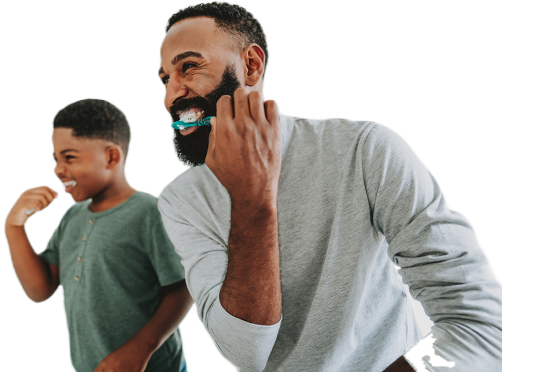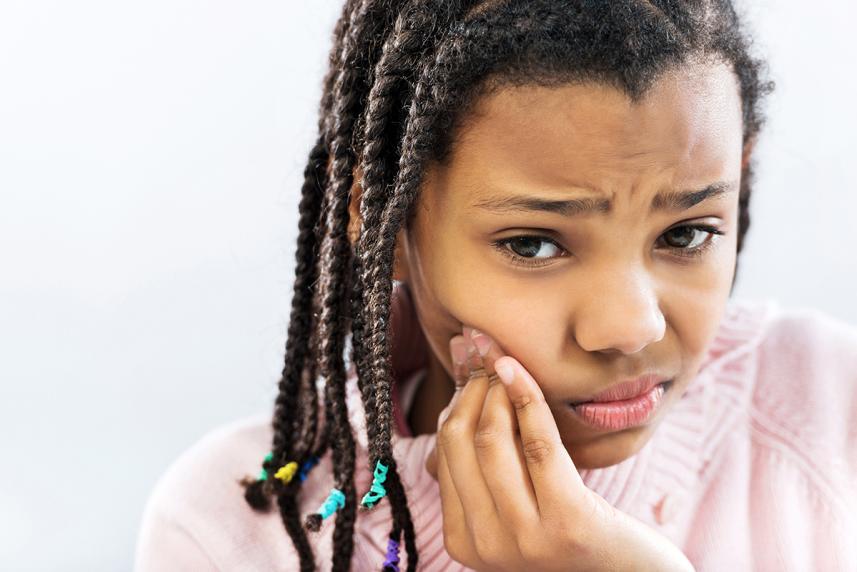
Your Premier Access plan makes it easy. No travel. No scheduling hassles. No additional cost to you! Click below to find your school and sign up.*
*You’ll be directed to MySchoolDentist to complete a permission form.
From canker sores to cavities, learn what causes mouth pain for kids and what you can do to ease their pain.

If your child comes to you and says their mouth hurts, your instinct is to figure out what’s going on. Unfortunately, pinpointing the source is more easily said than done.
Any number of issues could cause mouth pain. Keep reading to learn more about the top causes of an achy mouth, why they happen, and (most important!) how to provide relief.
Cavities are one of the most common causes of mouth pain in children.
Cavities are usually caused by two factors: Poor brushing habits and the bacteria that live in your mouth. Bacteria are drawn to the sugars in the foods you eat. Brushing your teeth every day removes those bacteria.
When you don’t brush, you create the perfect environment for plaque, a sticky film that attacks your tooth enamel. Over time, this plaque can make your teeth feel sore and painful. When the plaque lives on your teeth for a while, it can make tiny holes. Those are cavities.
What you can do: Make sure your child brushes and flosses every day, avoids too many sweets, and gets regular dental checkups.
Canker sores, also known as aphthous ulcers, are small, painful sores that pop up inside the mouth. They can make it hard for a child to eat, drink, or even talk.
Scientists have yet to uncover the exact cause of canker sores, according to the National Institutes of Health (NIH). They may be triggered by an injury, stress, or not having enough folic acid, iron, or vitamin B12 in your diet.
There isn’t any way to stop them from happening. But the good news is that even though canker sores hurt, they’re usually harmless. They also heal on their own.
What you can do: To help your child deal with the discomfort, try over-the-counter pain-relieving gels, creams, or mouthwashes. Ask your dentist or pediatrician for recommendations.

Your Premier Access plan makes it easy. No travel. No scheduling hassles. No additional cost to you! Click below to find your school and sign up.*
*You’ll be directed to MySchoolDentist to complete a permission form.
Gingivitis is a disease that causes red, swollen, and tender gums, according to the NIH. It can also cause bad breath and gums to bleed while brushing or flossing.
It is often caused by sloppy dental habits. If kids don’t brush or floss the right way, it can lead to a lot of plaque. The plaque irritates the gums and, over time, causes gingivitis.
What you can do: To avoid this issue and help it heal quickly, start with good dental care. That means brushing twice a day, flossing, and getting regular cleanings. Talk to your child’s dentist about other treatment options if gingivitis doesn’t go away with regular cleanings and good brushing habits.
Infections are another common cause of mouth pain in children. A mouth infection can lead to a lot of pain, a hard time swallowing, and even fevers.
Cold sores are a common mouth infection and are different than canker sores. Cold sores are caused by a virus and are contagious. They also cause painful blisters in the mouth area, often on the lips or gums. Usually, they take a week or two to go away.
What you can do: Get medical advice as soon as you can. They can offer medicine such as antiviral medications or creams to treat and heal the issue.
You may think of teething as something that only happens to babies, but kids begin to get their permanent adult teeth as early as age 6. Children may experience pain in their jaw where the tooth is pushing up. This is particularly true of their 6-year molars.
What you can do: Have your child gently massage their gums with a damp toothbrush to help ease the pain. Eating and drinking cold, soft food is another option. Children’s acetaminophen or ibuprofen can also ease the pain.
Loose teeth can also be a bother. Here are 6 dos and don’ts for handling loose baby teeth.
Accidents happen. Injuries from falls, slips, sports, and more can lead to all kinds of problems. For example, broken or lost teeth or cuts to the lip or tongue.
What you can do: While you can’t avoid every accident, you can still protect your child. Always make sure your child has the right safety gear for what they’re doing. Things like helmets, mouth guards, and padding are helpful during activities that might involve head contact.
Sources: